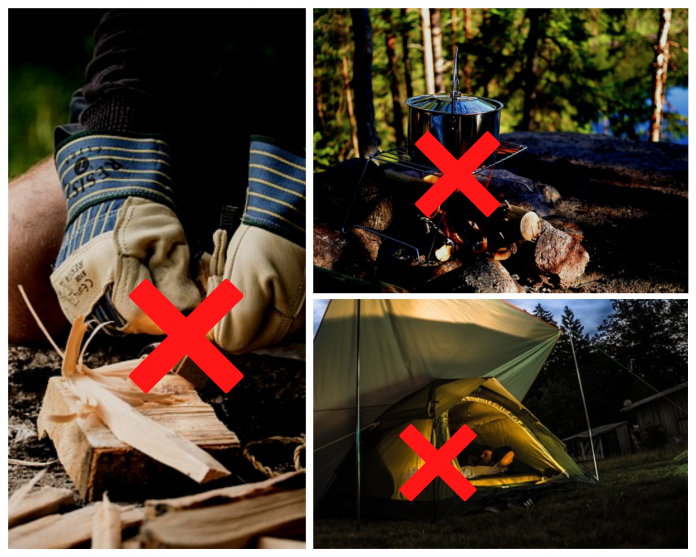Imagine that you had to leave everything behind and run for your life because something bad happened. How long could you stay alive?
In this kind of situation, your survival would depend on what you were able to grab on your way out the door and what you were carrying with you when the disaster happened.
This article will talk about what you should always have with you and what you should leave out of your EDC. while also thinking about ways to carry things that are easy to get to and could save your life in an emergency.
Everyday Carry Replacements
There are a lot of EDC websites on the web, and most Prepping forums have lively discussions about EDC.
It’s an interesting topic because it has cool-looking gadgets and good photos. I do like the minimalist approach, but everyone agrees that there are some things you can’t live without.
It doesn’t make sense to always carry a full survival pack. And, following the trend toward less stuff, we’ll talk about what you should start taking out of your EDC.
Some old necessities are being replaced by new technologies, while others are being replaced by new ways of making things.
The idea is that you should always have your EDC with you unless you are in the shower or sleeping.
If anyone laughs at the idea of always carrying something, remind them that everyone has their cell phone with them all the time.
Let’s talk about what you need and what you can leave out.
Stop Carrying Knives And Tools
Serrated knives work better for cutting bread and wood, while smooth blade knives work better for cutting meat, twine, fabrics, etc., as long as they are sharp. Should you take both of them?
You could ask the same thing about tools like pliers or about tools in general. I like fencing pliers for big jobs, sharp nose pliers for small jobs, side cutters for general cutting, and a wire rope cutter for fences and cables. It would be silly to carry them all.
A good knife could be used as an axe, machete, or saw to cut through plywood doors and skin a rabbit.
Related: 9 Things You Must Take With You Into the Wild for Long-Term Survival
There are multi-use knives made by Kabar and other companies that will meet most of your needs. These knives can help you soften the ground so you can dig by hand and can also be used as weapons.
And while I know that a “cure-all” is actually a “cure-nothing!”
Multi-use knives can do a little bit of everything, which is better than nothing when you’re in a pinch.
The same notion can be used with multitools.
Any craftsman or mechanic would probably prefer to have all of their tools with them, but when you are running for your life, you need to carry less.
Some multitools that are more useful have pliers that can also be used as ratchets to loosen bolts and other things. You could wear two multitools on your belt and be ready for a lot of different situations.
Most multitools have blades that can cut and saw, so you might even be able to put your knife away for a while.
Stop Carrying Fire-Lighters
You can’t carry fire, but you can carry the things you need to start one.
Bring a small flask of strong moonshine or bourbon.
Alcohol can help you start a fire because it burns.
It can also be used as an anesthetic when consumed or to clean and disinfect injuries.
Alcohol makes you braver, but too much of it will mess up your coordination and judgment, so don’t drink too much.
Stop Carrying Water
Water is heavy and hard to move around with all day. But if you don’t drink water, you can lose it pretty quickly. When you’re dehydrated, it’s harder to make good decisions.
The ability to “get” some water will help, so a personal water purification system like Lifestraw is strongly recommended. Lifestraw makes even the worst water safe to drink.
If you choose a vest or belt with water reservoirs, keep those reservoirs full.
Stop Carrying Paracord
There are many ways to use paracord.
From sleeping tied to a tree branch to tying down enemies, setting traps, and making shelters,
it’s not very useful to carry a roll of paracord, so buy a few bracelets instead.
If you wore a paracord bracelet on each arm, you would have a lot of cords with you at all times, and you wouldn’t even know it.
I also suggest that you make a small loop out of 30 feet of fishing line and put it in the same ziplock bag as your lighter.
Stop Carrying Flashlights
Drop the heavy flashlight and use your phone instead. Smartphones serve multiple purposes.
Related: 8 Things That Will Be Highly Valuable After an EMP
There are apps that let you control the brightness and battery life of your flashlight and give you strobes and other options for intermittent lighting.
Keep in mind that lights use energy and will shorten the life of your batteries.
Have a glow stick just in case.
Stop Carrying Shelter
Check your outdoor store for survival blankets or survival blankets that can also be used as a parka.
They can be used to stay, build a shelter, or make a makeshift backpack because they are waterproof. Some of these can be folded up to the size of a handkerchief and put in your pocket.
Stop Carrying Maps
Mobile phones are essential. They can be used to track you, which is good when your family is looking for you but bad when bad guys are.
There are lights, GPS, and games on phones.
Make sure you download apps that let you use maps and navigation even when you’re not connected to the internet.
Helpful hint: Your battery will die. So make sure your battery can be charged.
Related: How To Properly Store And Stack Firewood
Powerbanks are great, and you can even get some that have a solar panel built right in.
Chargers that you turn by hand are one of the best tools. Most of the time, they are built into a portable unit that has both a flashlight and a power bank.
Stop Carrying Compasses
Many great sports and fitness watches have batteries that last for days and come with downloadable maps that can help you find your way. Buy the best thing you can.



